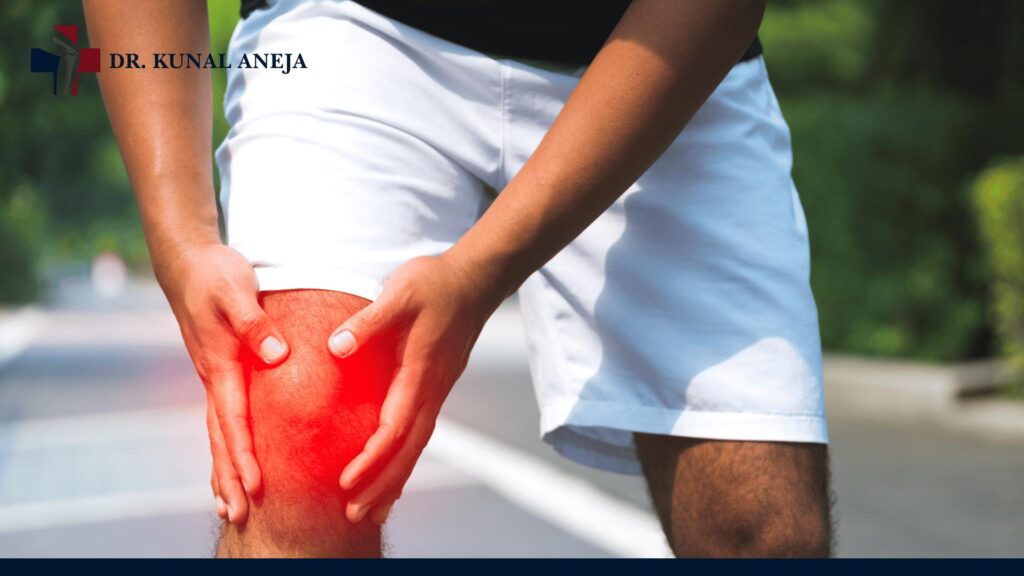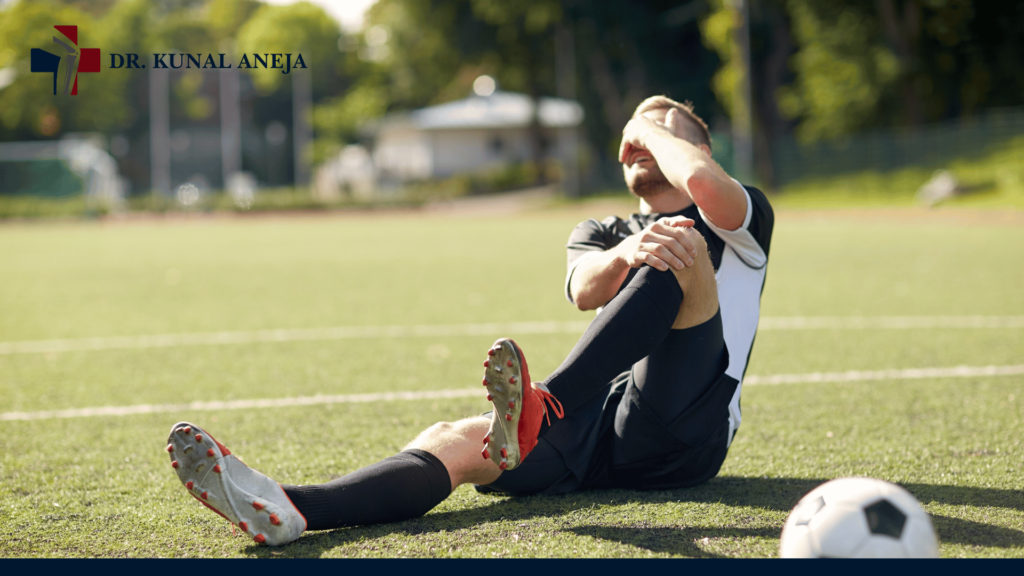Overview
Knee replacement surgery has become one of the most successful and life-changing procedures for patients suffering from chronic knee pain, arthritis, or joint deformities. However, the success of the surgery doesn’t end in the operation theatre—it extends into the recovery phase. According to Dr. Kunal Aneja, the Best Knee Replacement Surgeon in Delhi, post-operative care plays a pivotal role in ensuring optimal recovery, long-lasting results, and pain-free movement.
Many patients unintentionally make mistakes during recovery that can lead to delayed healing or complications. In this guide, Dr. Aneja shares his expert advice on the top five mistakes to avoid after knee replacement surgery, along with professional tips for a smooth and successful recovery.

1. Skipping Physiotherapy and Post-Operative Exercises
One of the most common and serious mistakes patients make after knee replacement surgery is neglecting physiotherapy. Many people assume that rest is enough to heal, but that’s far from true.
Why it’s a problem:
Physical therapy helps restore mobility, strengthen muscles, and improve flexibility. When patients skip or delay physiotherapy, stiffness and scar tissue formation can occur, making it difficult to regain full range of motion.
Expert Tip by Dr. Aneja:
Start physiotherapy as soon as your surgeon recommends—usually within 24–48 hours after surgery. Follow your rehabilitation plan religiously under the guidance of a certified physiotherapist. Consistency is the key to achieving a natural walking pattern and complete joint function.
2. Ignoring Pain or Overexerting Too Early
Another major post-surgery error is either ignoring pain or trying to “push through” discomfort too soon. Some patients assume that if the pain has subsided, they can resume all activities immediately.
Why it’s a problem:
Overexertion can lead to swelling, inflammation, or even dislocation of the implant. Conversely, ignoring persistent pain can be a sign of infection or other complications that require prompt medical attention.
Expert Tip by Dr. Aneja:
Listen to your body. Gradually increase your activity levels, and don’t hesitate to report any unusual pain, redness, or swelling to your surgeon. Pain management is an essential part of recovery—proper rest and controlled movements help ensure long-term stability.
3. Poor Nutrition and Hydration
Nutrition often goes overlooked after knee replacement surgery, but it is a cornerstone of recovery. Proper nourishment aids in wound healing, bone regeneration, and muscle strength.
Why it’s a problem:
A diet lacking in protein, vitamins, and essential minerals can delay tissue repair and increase the risk of infection. Additionally, dehydration can lead to fatigue and muscle cramps, slowing down the rehabilitation process.
Expert Tip by Dr. Aneja:
Include protein-rich foods like eggs, fish, lentils, and dairy in your daily meals. Ensure adequate intake of Vitamin C, D, and calcium to support bone and joint health. Stay hydrated by drinking at least 2–3 liters of water daily unless medically restricted.
4. Neglecting Regular Follow-Ups
Many patients assume that once the surgery is complete and pain subsides, there is no need for regular check-ups. This is one of the biggest mistakes that can compromise long-term results.
Why it’s a problem:
Skipping follow-up appointments means potential complications like implant loosening, infection, or misalignment might go unnoticed. Regular visits allow your surgeon to monitor your recovery and make timely adjustments if required.
Expert Tip by Dr. Aneja:
Always attend your scheduled follow-ups. Even if you feel fine, periodic evaluations are crucial for assessing implant function and joint alignment. Dr. Aneja emphasizes that consistent medical supervision ensures you maintain pain-free, active movement for years after surgery.
5. Failing to Maintain an Active Lifestyle Post-Recovery
Once recovery is complete, some patients fall into a sedentary lifestyle again, fearing damage to their new joint. This misconception can be detrimental to long-term joint health.
Why it’s a problem:
A lack of physical activity can weaken surrounding muscles, reduce joint flexibility, and affect blood circulation. On the other hand, excessive high-impact activities can strain the prosthesis.
Expert Tip by Dr. Aneja:
Adopt a balanced exercise routine—low-impact activities like walking, swimming, or cycling are ideal. Regular movement keeps your knee joint lubricated and functional. Avoid high-impact sports unless cleared by your orthopaedic surgeon.
Why Choose Dr. Kunal Aneja for Knee Replacement Surgery in Delhi
When it comes to joint care, Dr. Kunal Aneja stands out as one of the Best Knee Replacement Surgeons in Delhi. Known for his compassionate patient approach and precision-based surgical techniques, he specializes in Robotic and Computer-Assisted Knee Replacement Surgeries that ensure minimal pain, faster recovery, and greater accuracy.
Dr. Aneja’s treatment philosophy combines advanced orthopaedic technology with individualized patient care. His expertise in knee, hip, and sports injury surgeries has earned him recognition across India and internationally.
Key Advantages of Choosing Dr. Kunal Aneja:
- Expertise in Robotic and Navigation-Based Knee Replacement for enhanced precision
- Focus on minimally invasive techniques ensuring faster rehabilitation
- Comprehensive post-operative care and physiotherapy guidance
- Strong track record of successful outcomes and patient satisfaction
Tips for a Faster and Safer Recovery
- Follow Your Doctor’s Instructions: Never self-medicate or alter your rehabilitation plan.
- Use Assistive Devices: Walking aids like walkers or canes can provide support initially.
- Maintain a Healthy Weight: It reduces pressure on your knee joint.
- Practice Deep Breathing Exercises: Helps prevent post-surgery complications like pneumonia.
- Stay Positive and Patient: Full recovery takes time; consistency and patience are vital.

Conclusion
Recovering from knee replacement surgery is a journey that requires discipline, patience, and professional guidance. By avoiding these five common mistakes, you can ensure a faster, smoother, and more successful rehabilitation.
With Dr. Kunal Aneja, one of the Best Knee Replacement Surgeons in Delhi, you receive not just surgical excellence but also comprehensive support throughout your recovery journey. His patient-centric care, use of advanced technology, and evidence-based approach make him a trusted name in orthopaedics across India.
FAQs
1. How long does recovery take after knee replacement surgery?
Ans. Most patients resume normal activities within 6–8 weeks, though complete recovery can take 3–6 months.
2. Is physiotherapy mandatory after knee replacement?
Ans. Yes, it is essential for regaining full motion, strength, and balance in your knee joint.
3. What is the success rate of knee replacement surgery in Delhi?
Ans. With experienced surgeons like Dr. Kunal Aneja, the success rate exceeds 95% when post-operative care is followed properly.
4. When can I start walking after knee replacement?
Ans. Patients usually start walking with support within 24–48 hours post-surgery under supervision.
5. Is robotic knee replacement better than traditional surgery?
Ans. Yes, robotic knee replacement offers enhanced precision, minimal tissue damage, and faster recovery compared to traditional methods.

